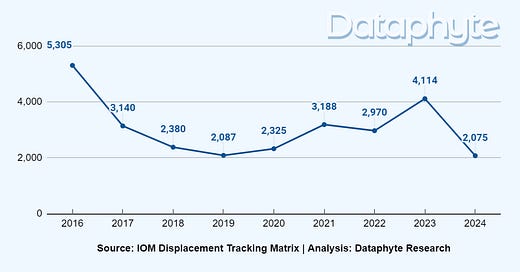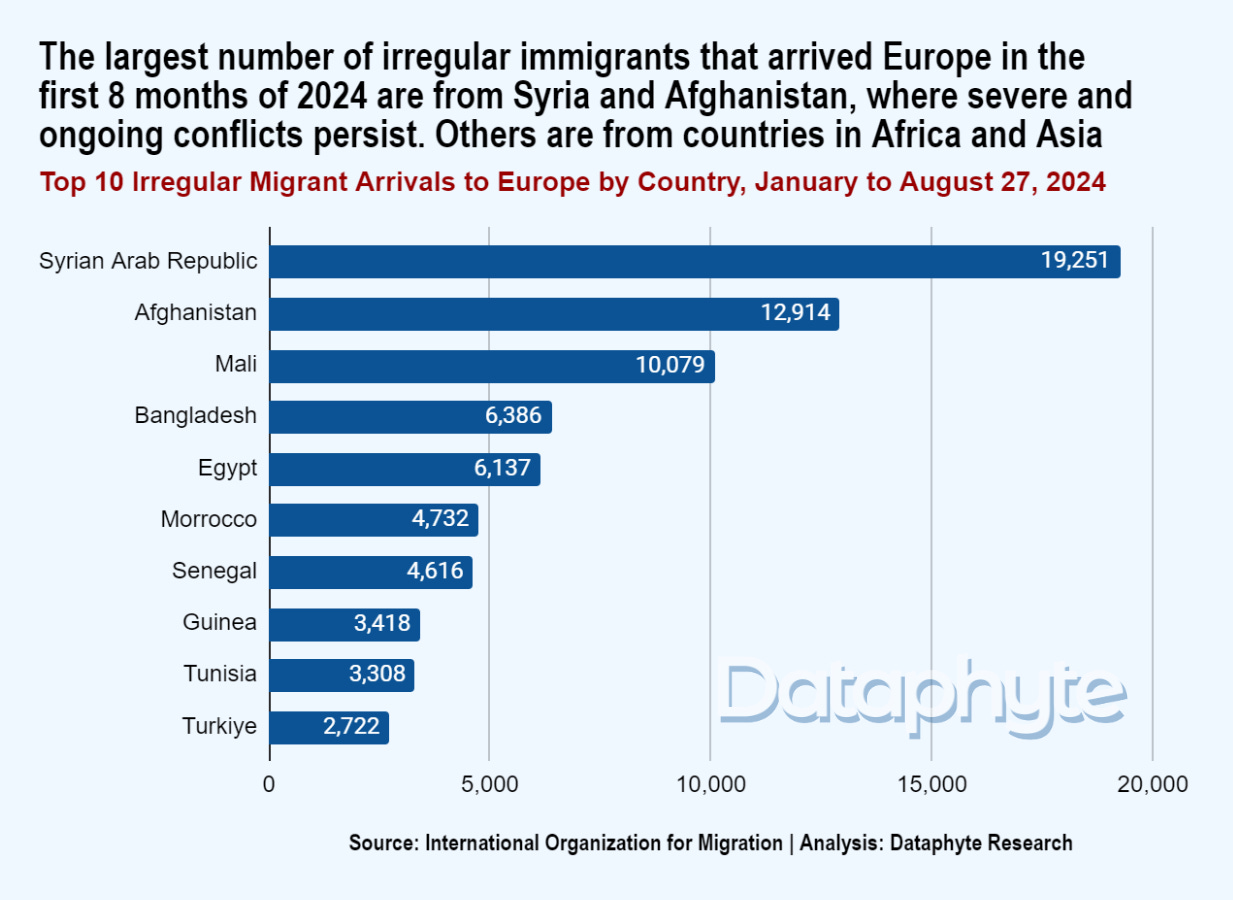About 136 African migrants heading to Europe through irregular routes were rescued from a boat on August 26, near the Canary Island of El Hierro in Spain.
Rescued migrants as these are rare.
Last month, 89 migrants died at sea with dozens still missing after their boat capsized off the coast of Mauritania en route to Europe.
“In the first five months of 2024, an irregular migrant died every 45 minutes, amounting to 32 deaths per day, in the Atlantic Ocean between North Africa and the Canary Islands,” the Turkish News Agency Anadolu Ajansı estimated.
Like the mental slaves in Bob Marley’s merchant ships, these migrants are seized first by desperation, then shackled by despair as they embark on their boat of fate to some occidental paradise or the ocean’s bottomless pit.
They drowned long before they dared the cold rage of the sea in makeshift migrant ships.
Migrant Ships
They leave their home countries fleeing crises, conflict, violence, persecution, state insecurity, extreme poverty, homelessness, and hopelessness.
The few that survive the roads less travelled and arrive in Europe face an unending cycle of dangers, such as the risk of detention, financial loss, violence, illness, and death on the other side of the waters.
While at it, some risk becoming victims of human trafficking and other forms of exploitation. And as they try to settle and rebuild their lives, many encounter daily racism, xenophobia, and discrimination.
The question is: Are the factors that typically drive people to flee their home countries more perilous than the risks involved in crossing over to Europe?
According to Amnesty International, not everyone who leaves their country is fleeing from danger. Some may believe they have better chances of finding jobs abroad, particularly if they have the education or resources to pursue opportunities elsewhere.
The International Migration Organisation defines irregular migration as the movement of persons that takes place outside the laws, regulations, or international agreements governing the entry into or exit from the State of origin, transit, or destination.
Categories of migrants who might resort to irregular migration routes include asylum seekers, trafficking victims, and minor migrants.
Over 2,075 irregular migrants headed to Europe through the Mediterranean, Western African Atlantic, and the Western Balkan routes, have been reported dead or missing between January and August 27, 2024.
Despite a decrease in deaths and missing migrants en route to Europe over the past 9 years, the journeys remain highly dangerous, especially for those crossing by sea.
The decline in the number of dead and missing migrants coincides with the decline in arrivals of irregular migrants to Europe both by sea and land crossings. The number of migrants who arrived in Europe between 2016 and August 27, 2024, declined by 71%.
The overall reduction in the number of arrivals, deaths, and missing irregular migrants to Europe could be attributed to stricter border controls implemented by European countries.
According to a report by the European Parliament: “To counter irregular migration, the EU has strengthened border controls, improved the management of new arrivals and made returns of irregular migrants more efficient. It has also bolstered legal labour migration and ensured that asylum applications can be dealt with more efficiently.”
The largest number of irregular immigrants arriving in Europe originated from Syria and Afghanistan, where severe and ongoing conflicts persist. Others are from countries in Africa and Asia.
In Africa, the proportion of irregular immigrants arriving in Europe from West and Central African countries has grown over the past seven years.
Migrants from West and Central Africa continue to favour Italy as a destination. Among the 105,935 nationals of West and Central African countries who arrived in Europe in 2023, 64% (or 67,890) of them went to Italy while others went to either Spain, Greece, Cyprus, or Malta.
The highest number of irregular migrants from West and Central Africa came from Guinea and Cote d'Ivoire.
In particular, the main destination countries for West and Central African nationals vary according to their nationality. Nationals of Guinea, Cote d’Ivoire, Burkina Faso, Mali, Cameroon, and The Gambia mainly prefer Italy as a destination. Nationals of Senegal continue to ply roads to Spain, and Nigerian migrants mainly travel to Cyprus or Malta.
Merchant Ships
The pattern of migrant deaths during irregular migration is reminiscent of the era of the slave trade when Africans were transported to Europe and the Americas to serve as cheap labour.
The number of irregular migrants from Africa who journey through land and sea routes to Europe annually now exceeds the same number forcefully transported in slave merchant ships annually from the 16th century through the 19th century.
As of 2023, people who died or went missing travelling irregular road and sea routes exceeded the number of African Slaves who died or went missing at sea in the last 16 years.
Between 1501 and 1866, more than 12.33 million African slaves were transported on merchant ships to Europe and the Americas. About 1.82 million (14.5%) of these slaves were reported dead or missing at sea.
The countries that captured the highest number of slaves from Africa during the centuries when the slave trade persisted were primarily in Europe, along with some in the Americas.
Bob Marley and the Burden of Foreboding
Bob Marley’s parting psalm, Redemption Song, bears the burden of his foreboding of history repeating itself - that while mercantile slavery was done with, an unbroken cycle of mental slavery in the victim could reenact it.
Many see links between the 400 years of trans-Atlantic transport of African slaves by Europeans and the 40 years of Cross-Mediterranean Undocumented Migration of Africans to Europe.
Both are forced migration in some sense.
In the former, European slave merchants dehumanised African men, women, and children before deporting them overseas to work as slaves.
In the latter, Europeans despoil their natural resources, diminish their political agency, and deny them economic independence, leaving the people destitute and desperate to follow their lost heritage to Europe.
According to a This Day editorial, “the current migration crisis is a cruel twist of the logic of the transatlantic slave trade. Under the ancient regime, African agents of European slave traders hunted men and women and forcibly sold them off to be transported across the Atlantic to the ‘New World’. In the modern ‘trade’ that started about three decades ago, Africans are willingly subjecting and submitting themselves as fodder and merchandise for enslavement across the Mediterranean just to reach countries in Europe, Asia, and the Middle East.”
In her work, Africa's Irregular Migration to Europe: A Reenactment of the Transatlantic Slave Trade, Patricia Ogu contends that 21st-century irregular migration from Africa to Europe mirrors the historical transatlantic slave trade.
The report draws a parallel between the plight of Africans who migrate to Europe with hopes for a better life but often find themselves in detention camps, uncertain of when they will be released. This situation echoes the experiences of African slaves disembarking in the Americas and Europe during the slave trade, who were auctioned off to the highest bidder before being sent to work on plantations or in mines for the rest of their lives. Female slaves, in particular, were often relegated to domestic duties for their masters and mistresses.
The denial of rights and freedoms to today’s irregular migrants in detention camps is comparable to the loss of freedoms and rights experienced by African slaves, who lived under the control of their masters or mistresses.
Bob Nesta Marley looked back in triumph at those 400 cruel years that dislocated his survivor ancestor from Africa to the Caribbean and remarked:
Old pirates, yes they rob I
Sold I to the merchant ships
Minutes after they took I
From the bottomless pit
But my hand was made strong
By the hands of the almighty
We forward in this generation
Triumphantly
Yet, he looked ahead as he neared the shore of the only ethereal Sea, having made peace with his mortality, and urged those left behind: “Emancipate yourselves from mental slavery; None but ourselves can free our own minds”
He embarked on his ship back to that African spot of departure, never to be enslaved again. How does he rest in peace if he learns the slave trade has returned fully, as African leaders do nothing but insist “It’s just a part of it; we’ve got to fulfil the book.”











